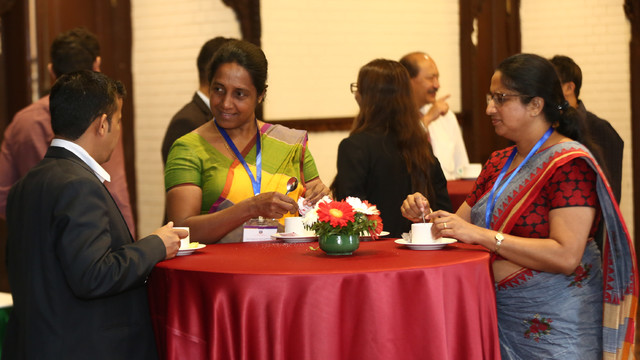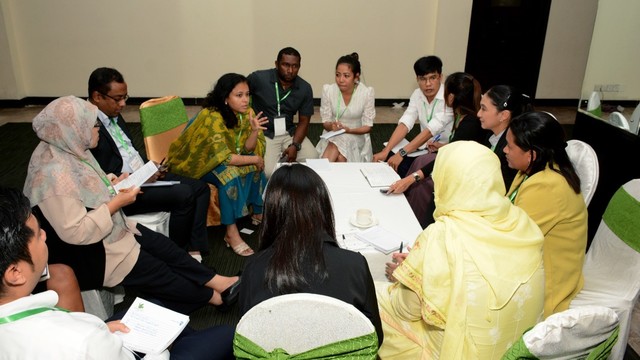Targeting support to women
IIED aims to increase female participation in training workshops, support more women to attend the UN climate negotiations and track participants’ involvement in the negotiations themselves. We’re also striving to understand the causes of gender imbalance in climate negotiations, with a focus on LDCs, and highlight best practices to advance gender equality.

Women participants at a Nepal workshop received training and support to address the gender gap at the UNFCCC negotiations (Photo: Brianna Craft/IIED)
One of our aims is to see women negotiators become more active in the United Nations Framework Convention on Climate Change (UNFCCC) process. To do this, we directly support women to attend the climate negotiations.
In parallel, we also work to achieve gender-balanced training workshops and track our participants’ UNFCCC involvement. All while studying the challenges women face participating in the UN climate negotiations, where far more men than women continue to hold places at the decision-making table.
Direct support to women
Our programme enables us to select new negotiators to help become experts in the negotiating process. Recipients are from the least developed countries – the group that has the largest gender imbalance in the UNFCCC attendance overall.
We provide logistical support to allow women who had participated in relatively few UNFCCC sessions to attend the climate negotiations. These new negotiators join their peers for daily check-ins, where they learned from IIED staff and each other about the complex UNFCCC process and how to become active members of the appropriate negotiating blocs.

IIED staff and supported negotiators meet for a daily catch-up at the Bonn negotiations (Photo: Fernanda Alcobe/IIED)
Supported negotiators are encouraged to document their experiences by writing blogs. In Eva Peace Mukayiranga’s, she explains how she will take forward skills learnt at the UN climate negotiations.
Other women delegates have highlighted how our support helps them improve their preparation for and participation in the negotiations:
Female training participant, bursary holder I think I have a better understanding now of how to go to negotiations and I know how to prepare. For example, it takes a certain type of language. Clear, consistent, coherent
Gender-balanced workshops to increase women’s participation
During our regional training workshops in 2016, we noticed we weren’t seeing equal numbers of male and female participants. Like the UN climate negotiations themselves, most of the delegates the governments elected to send were men.
In response, we revamped our approach. In the invitation letters, we made clear the importance of nominating a gender-balanced group of participants. At the end of each workshop, we distributed certificates stating the skills the participants had gained and invited them back to attend the following year.
With these efforts, we attracted more female participants to our trainings workshops. A review of our work between 2016 and 2018 showed promising results: we trained the same number of women and men.
Participants in the 2023 Asia-Pacific regional training workshop take on drafting negotiating text (Photo: copyright Prakriti Resources Centre)
After five years of workshops, 48% of our participants were female. When we compared this against the ratios in the negotiations process as a whole, using the UNFCCC ‘report on gender composition’ (PDF) that in 2019 stated that 37% of delegates were women, we saw that our trainings were surpassing the gender balance of the negotiations process overall, and helping increase the chances that women will be part of their countries’ delegations at the international climate negotiations.
Tracking participation in negotiations
Equipping delegates with the skills they need to participate in the UN climate negotiations is just half the story. We also want to see how many of our participants, having been trained, are put forward to represent their country at the international negotiations. Were the rates different for men and women? Do they remain so?
In 2019, Brianna Craft and Samantha McCraine looked at how well women are represented in spaces where international decisions on climate change are made, and in 2020, the duo detailed further efforts to bring more women to the UN climate change negotiations.
We scoured UNFCCC attendance lists and found that around half of those we had trained, and equal numbers of women and men, went on to join their country delegations.
The key to meaningful engagement is continuity, so we also tracked who participated in multiple sessions of the climate negotiations.
Again, of the men and women we trained, the number chosen to continually participate was relatively equal: 19 of the women we trained (24%) attended two or more negotiating sessions, compared to the 31 men we trained (30%) who attended more than twice. Notably, the three participants who attended all seven UNFCCC negotiations from 2016-18 were men.

IIED senior researcher Brianna Craft, right, presents research at the UNFCCC gender workshop in Bonn in June 2019 (Photo: copyright Jennifer Jun)
As regional training workshops recommenced in 2023, we will continue to track how many delegates reach the negotiations, noting how these numbers compare for women and men.
Further reading:
- Winifred Masiko demanded an increase in finance to enable women to participate in climate planning
- The chair of the LDC Group discussed what is needed to enable greater representation of women from the least developed countries in international climate decision-making spaces
- Junior negotiator Prakriti Koirala wrote about the nitty gritty of how the loss and damage fund will work
- Eva Peace Mukayiranga described challenges and highlights from the negotiating rooms in Glasgow
- Xaysomphone Souvannavong and Fatima Athoumani wrote blogs that charted the sharp learning curve of an LDC negotiator and how they learned to make their voice count at the UN climate negotiations.
- Danise Love Dennis, from Liberia, who wrote a diary about her year-long learning journey
Contact
Fernanda Alcobé (fernanda.alcobe@iied.org) is a researcher in IIED’s Climate Change research group
Elaine Harty (elaine.harty@iied.org) is a senior project manager in IIED’s Climate Change research group
Tara Daniel (tara@wedo.org) is senior programme manager at WEDO




